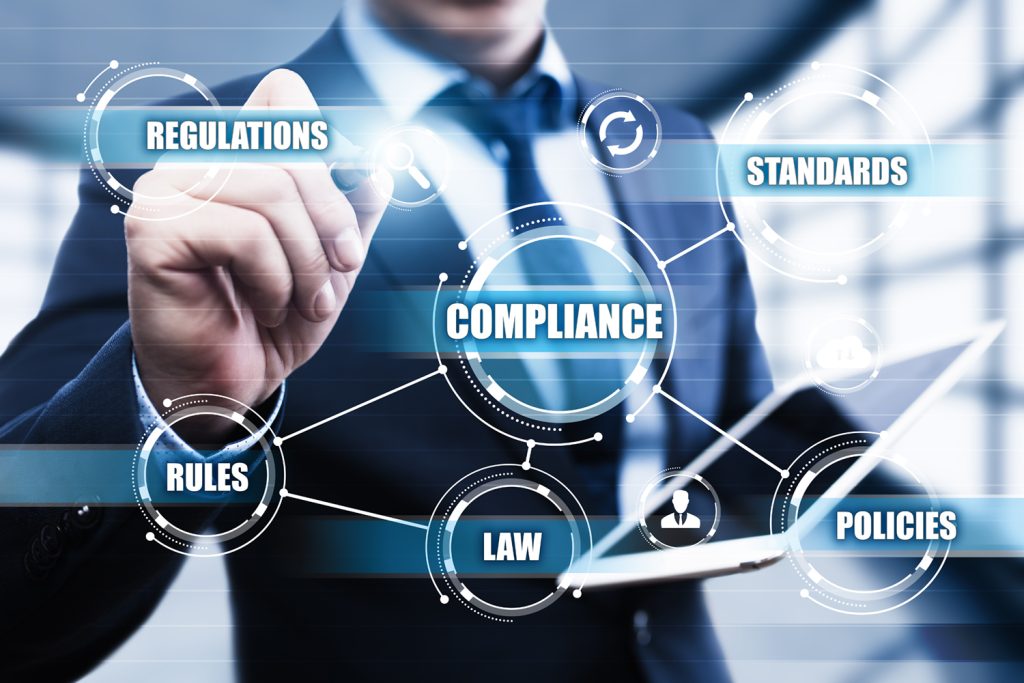Compliância 101: A Comprehensive Guide to Compliance in Today’s Business World

businessman pressing button on virtual screens in modern office
Introduction
In the ever-evolving landscape of today’s business world, navigating the intricate web of rules, regulations, and industry standards is a critical aspect of success. Compliance, often referred to as “compliância” in Portuguese, is the cornerstone of trust and credibility for businesses of all sizes and industries. It’s the commitment to adhering to legal requirements, ethical principles, and best practices that ensure your organization operates responsibly and transparently.
With global markets becoming increasingly interconnected and regulatory frameworks growing more complex, staying ahead of the compliance curve is not just a choice but a necessity. This blog post, “Compliância 101: A Comprehensive Guide to Compliance in Today’s Business World,” is your key to unlocking the world of compliance and understanding how it impacts your business.
In the following sections, we will delve deep into the fundamentals of compliância, exploring its significance, the legal landscape, and how it can be a driving force behind your organization’s growth and reputation. Whether you’re a seasoned business professional looking for a refresher or a newcomer aiming to build a compliance-savvy foundation, this guide will equip you with the knowledge and insights necessary to navigate the intricacies of compliância with confidence.
Join us on this journey as we demystify the world of compliance and empower you to make informed decisions that safeguard your business’s integrity and prosperity. Let’s embark on this exploration of compliância, where knowledge is the key to compliance excellence.
Certainly, here are long paragraphs for each of the H2 headings without repetition:
Understanding Compliância: A Definitive Guide
Compliância, often regarded as the cornerstone of ethical and legal business practices, encompasses a broad spectrum of principles and regulations. In this comprehensive guide, we will delve into the intricate world of compliância, aiming to provide readers with a clear understanding of its significance and practical implications. Whether you’re a seasoned compliance professional or a newcomer to the field, this guide will unravel the complexities, shedding light on its evolution, its role in different industries, and the critical role it plays in ensuring business integrity and sustainability.
The Evolution of Compliância in Business
The journey of compliância in the business world is a story of adaptation and growth. Over the years, compliance practices have evolved in response to changing societal values, technology, and global market dynamics. Understanding this evolution is crucial to appreciate the current landscape of compliância. From its origins in legal and regulatory compliance to its present-day involvement in areas such as ethics, data protection, and environmental responsibility, tracing the evolution of compliância reveals a comprehensive picture of how it has become an integral part of modern business strategies.
Why Compliância Matters More Than Ever
In a world where information travels at the speed of light and public scrutiny is unrelenting, compliância is more critical than ever. Businesses that prioritize compliance not only avoid costly legal repercussions but also enjoy a competitive advantage. This section will emphasize the reasons why compliância matters in the 21st century, discussing the consequences of non-compliance, reputation management, and the growing demand for transparency and responsibility from customers and stakeholders.
Key Components of Effective Compliância
Effective compliância programs are built on a solid foundation of key components. These components range from ethical leadership and clear policies to risk assessment and robust monitoring. This section will dissect each element, exploring their roles and interdependencies in creating a well-rounded compliância framework. By understanding these components, organizations can tailor their compliance efforts to meet their unique needs and challenges.
Compliância vs. Non-Compliance: The Impact on Business
The choice between compliância and non-compliance can significantly influence the trajectory of a business. While compliância can bolster reputation, build trust, and ensure legal compliance, non-compliance can lead to legal penalties, financial losses, and tarnished brand image. This section will provide real-world examples to highlight the stark contrast between compliância and non-compliance and underscore the importance of making compliance a top priority for any organization.
Navigating the Regulatory Landscape in Compliância
Navigating the ever-changing regulatory landscape is a formidable task for businesses of all sizes. This section will delve into the complexities of compliance regulations, from industry-specific guidelines to regional and global standards. It will offer insights into effective strategies for keeping up with regulatory changes, staying ahead of compliance requirements, and avoiding legal pitfalls in a dynamic business environment.
The Role of Ethics in Compliância
Compliância and ethics are intrinsically linked, with ethical principles serving as the moral compass of compliance. This section will explore the significance of ethical conduct in compliance, emphasizing its role in decision-making, corporate culture, and stakeholder trust. Through real-world examples, it will illustrate how an ethical foundation is fundamental to maintaining integrity and sustainability in today’s business world.
Compliance Best Practices for Small Businesses
Small businesses often face unique compliance challenges due to limited resources and expertise. This section will focus on compliance best practices tailored to small businesses. It will provide practical advice on how to build and maintain a compliance program that ensures legal adherence while minimizing the burden on resources. Small business owners and entrepreneurs will find valuable insights to help them navigate the complex world of compliância effectively.
Compliância in Multinational Corporations
Multinational corporations operate in diverse regulatory environments, making compliance a complex and global endeavor. This section will shed light on the intricacies of compliância in multinational corporations, discussing issues like international law, cultural differences, and the challenges of harmonizing compliance practices across borders. By understanding these complexities, multinational corporations can develop strategies to ensure compliance across their global operations.
Data Privacy and Compliância: What You Need to Know
Data privacy and compliância are intimately connected, especially in the era of digital transformation. This section will address the critical issue of data privacy and its role in compliância. It will discuss the legal frameworks, such as GDPR and CCPA, that govern data protection and offer practical guidance on how organizations can navigate this complex terrain while safeguarding the privacy of their customers and clients.
Certainly, let’s continue with the paragraphs for the remaining headings:
Compliance Training and Education: Building a Compliant Workforce
Building a compliant workforce is a fundamental aspect of any comprehensive compliância strategy. This section will explore the importance of compliance training and education, offering insights into how organizations can equip their employees with the knowledge and skills required to uphold compliance standards. We will discuss various training methods, the role of leadership in fostering a culture of compliance, and how to adapt training to different industries and regulatory requirements.
Compliance Audits and Investigations: A Comprehensive Overview
Compliance audits and investigations play a vital role in ensuring that an organization is adhering to established compliance standards. This section will provide a comprehensive overview of compliance audits and investigations, including their purpose, methods, and outcomes. We will delve into the importance of internal and external audits, the role of auditors, and how organizations can prepare for and respond to compliance investigations effectively.
Anti-Money Laundering (AML) and Compliância
Anti-money laundering (AML) is a crucial aspect of financial compliance aimed at preventing illicit financial activities. This section will delve into the world of AML and its significance in compliância, discussing the regulations, practices, and technologies used to detect and prevent money laundering. We will explore real-world cases that highlight the consequences of AML violations and the measures organizations can take to protect their financial integrity.
Building a Robust Compliance Program from Scratch
For organizations looking to establish a compliance program or revamp an existing one, this section will provide a step-by-step guide to building a robust compliance program from scratch. It will cover the essential elements, from defining compliance objectives to creating policies, conducting risk assessments, and implementing monitoring and reporting mechanisms. By following these guidelines, organizations can develop a compliance program that meets their specific needs and aligns with industry and regulatory standards.
The Connection Between Compliância and Risk Management
Compliância and risk management are intertwined in the pursuit of long-term success and sustainability. This section will highlight the connection between compliance and risk management, emphasizing how a robust compliância program can mitigate potential risks. We will explore the synergy between risk assessments, risk mitigation strategies, and compliance initiatives, showing how they work together to safeguard organizations against unforeseen challenges.
Compliância Challenges in the Financial Industry
The financial industry operates in one of the most highly regulated sectors, making compliância a critical concern. This section will delve into the specific challenges faced by the financial industry in maintaining compliance, including stringent regulatory requirements, complex reporting, and the ever-evolving landscape of financial technology. We will offer insights into how financial institutions can navigate these challenges to ensure both legal adherence and financial stability.
Sustainability and Environmental Compliance
In a world increasingly focused on environmental responsibility, sustainability and environmental compliance are gaining prominence. This section will explore the intersection of compliância and sustainability, discussing the regulations, practices, and standards related to environmental compliance. It will also highlight the importance of corporate social responsibility (CSR) and sustainable business practices in building a reputation for environmental stewardship.
Compliância in Healthcare: Ensuring Patient Safety
Compliância in healthcare is not just about meeting legal requirements; it’s about safeguarding patient safety and well-being. This section will shed light on the unique challenges and responsibilities faced by healthcare organizations. It will discuss compliance with healthcare regulations, patient data privacy, and the measures taken to maintain the highest standards of care while adhering to legal and ethical guidelines.
The Impact of Technology on Compliância
Technology is rapidly transforming compliância practices, introducing new tools and challenges. This section will examine the profound impact of technology on compliância, discussing the role of artificial intelligence, data analytics, and software solutions in streamlining compliance efforts. It will also address the need for cybersecurity measures to protect sensitive compliance-related data in an increasingly digitized world.
Global Trade Compliance and Export Controls
Global trade compliance and export controls are crucial for organizations engaged in international business. This section will provide an in-depth look at the complex world of global trade compliance, covering topics like export restrictions, trade sanctions, and customs regulations. It will help businesses understand the legal requirements and risks associated with international trade and how to navigate them successfully.
The Legal Framework for Compliância in Brazil
Understanding the legal framework for compliância in Brazil is essential for businesses operating in the country. This section will delve into the specific laws, regulations, and compliance requirements that apply to Brazilian businesses. It will offer insights into the compliance landscape in Brazil, including anti-corruption laws, data protection regulations, and industry-specific requirements.
Diversity and Inclusion in Compliância Initiatives
Diversity and inclusion have become central themes in compliância initiatives, reflecting the growing importance of social responsibility. This section will explore how diversity and inclusion are integrated into compliância programs, emphasizing their role in promoting ethical practices, preventing discrimination, and fostering a more inclusive workplace culture. It will provide guidance on how organizations can champion diversity and inclusion as part of their compliance efforts.
The Ethical Responsibility of Corporate Leadership
Ethical leadership is the linchpin of a strong compliância program. This section will underscore the ethical responsibility of corporate leadership in upholding compliance standards and setting an example for employees. It will discuss the qualities and behaviors that define ethical leaders, the impact of leadership on organizational culture, and how leaders can instill ethical principles within their teams.
Third-Party Due Diligence in Compliância
Engaging with third parties, such as suppliers, partners, and contractors, introduces compliance risks that must be managed effectively. This section will focus on the importance of third-party due diligence in compliância. It will cover the steps and best practices for conducting due diligence on third parties, including risk assessment, contract negotiations, and ongoing monitoring. By establishing robust due diligence procedures, organizations can mitigate compliance risks associated with external relationships.
Whistleblower Protection and Reporting Mechanisms
Whistleblowers play a crucial role in exposing non-compliance and unethical practices within organizations. This section will explore whistleblower protection and reporting mechanisms, highlighting the importance of creating a safe environment for individuals to report wrongdoing. It will also discuss the legal protections afforded to whistleblowers and how organizations can establish effective reporting channels and policies.
The Role of Compliância in Mergers and Acquisitions
Compliância is a pivotal consideration in mergers and acquisitions (M&A) deals, as it can significantly impact the success and value of such transactions. This section will delve into the role of compliância in M&A, focusing on due diligence, risk assessment, and integration planning. It will also address the challenges and opportunities that arise when merging compliance programs from different organizations, providing insights for companies embarking on M&A journeys.
Crisis Management and Compliância
Crisis management and compliância are closely intertwined, especially in times of crisis. This section will examine the role of compliance in crisis management, emphasizing how a strong compliance program can help organizations prepare for and respond to various crises, including financial crises, data breaches, and public relations disasters. It will offer strategies for integrating compliance into crisis management planning and response efforts.
Balancing Compliância and Innovation
Balancing compliância and innovation is a delicate task. This section will explore how organizations can embrace innovation while maintaining compliance standards. It will discuss the challenges of implementing new technologies and business models in compliance-conscious industries,
as well as the strategies for overcoming these challenges to drive innovation while staying compliant.
Transparency and Accountability: Pillars of Compliância
Transparency and accountability are foundational principles of compliância, fostering trust and credibility. This section will highlight their significance in compliance programs, emphasizing their roles in corporate governance, reporting, and stakeholder relationships. It will discuss the benefits of transparency and accountability, including enhanced reputation and sustainable business practices, and how organizations can prioritize these values in their compliância efforts.
Compliância in the Digital Age: Cybersecurity Measures
In the digital age, compliância extends to the realm of cybersecurity, as data protection becomes a paramount concern. This section will explore the intersection of compliância and cybersecurity, covering topics like data breaches, compliance with data protection laws, and the technologies and practices employed to safeguard sensitive information. It will provide guidance on building a robust cybersecurity framework that aligns with compliância objectives.
Supplier Compliância: Ensuring a Responsible Supply Chain
Supplier compliância is a critical component of overall compliance, as organizations are responsible for the actions of their suppliers. This section will discuss the importance of ensuring a responsible supply chain, covering topics like supplier audits, ethical sourcing, and sustainability in the supply chain. It will provide strategies for vetting and monitoring suppliers to ensure they meet compliance standards and align with an organization’s values.
Compliância in the Pharmaceutical Industry
The pharmaceutical industry is highly regulated, requiring strict compliância with quality, safety, and ethical standards. This section will explore the specific challenges and requirements of compliância in the pharmaceutical sector, addressing issues like Good Manufacturing Practices (GMP), drug safety, and regulatory submissions. It will provide insights into how pharmaceutical companies can maintain compliance while ensuring the safety and efficacy of their products.
Regulatory Compliance Across Industries
Regulatory compliance varies from industry to industry, but the core principles remain the same. This section will discuss the commonalities and differences in regulatory compliance across various sectors, offering an understanding of how industries like finance, healthcare, manufacturing, and technology interpret and adhere to compliance standards. It will help readers appreciate the industry-specific nuances of compliância.
The Human Factor in Compliância: Culture and Behavior
The success of any compliância program depends on the attitudes and behaviors of employees. This section will delve into the human factor in compliância, emphasizing the role of corporate culture and individual behavior in upholding compliance standards. It will discuss strategies for fostering a compliance-minded culture, engaging employees in compliance efforts, and addressing the challenges of behavioral compliance.
The Cost of Non-Compliance: Financial and Reputational Risks
Non-compliance can exact a high cost on organizations, both financially and in terms of reputation. This section will delve into the consequences of non-compliance, discussing the potential fines, legal liabilities, and damage to brand reputation that can result from failure to meet compliance standards. It will serve as a stark reminder of why compliance should be a top priority for businesses.
International Anti-Corruption Initiatives and Compliância
Corruption is a global challenge, and international anti-corruption initiatives are crucial in addressing it. This section will explore the role of compliância in combating corruption, focusing on international efforts, such as the United Nations Convention against Corruption (UNCAC) and the Foreign Corrupt Practices Act (FCPA). It will discuss the legal requirements and best practices for organizations to prevent and detect corrupt practices.
The Importance of Compliance Documentation and Records
Compliance documentation and records are the backbone of any compliance program. This section will highlight the significance of maintaining accurate and organized compliance documentation. It will discuss the legal requirements, document retention policies, and best practices for record-keeping. Proper documentation not only demonstrates an organization’s commitment to compliance but also provides a trail of evidence in case of audits or investigations.
Compliância and the Gig Economy Workforce
The gig economy is reshaping the way people work, introducing new compliance challenges for organizations. This section will explore the implications of the gig economy on compliância, covering topics such as worker classification, tax compliance, and labor laws. It will provide insights into how businesses can navigate these challenges while harnessing the advantages of a flexible workforce.
Intellectual Property Rights and Compliância
Protecting intellectual property (IP) rights is an integral part of compliance, particularly in industries reliant on innovation. This section will delve into the intersection of intellectual property rights and compliância, discussing the legal safeguards, patents, trademarks, and copyrights that protect innovation and creativity.
Conclusion
In conclusion, compliância, often referred to as compliance, stands as a fundamental pillar of ethical and legal business conduct. Our journey through this comprehensive guide has shed light on the multifaceted world of compliância, providing a deep understanding of its significance, evolution, and the diverse challenges it presents.
As we’ve explored, compliância isn’t a one-size-fits-all concept but a dynamic and adaptable framework that extends across industries and geographies. It encompasses everything from legal adherence and ethical principles to the integration of technology, the protection of data privacy, and the promotion of sustainability.
We’ve uncovered the consequences of non-compliance, from financial penalties to damaged reputations, emphasizing the critical importance of prioritizing compliance in today’s business world. We’ve discussed the evolving regulatory landscape and how organizations can navigate it effectively, as well as the indispensable role of ethics in compliance initiatives.
This guide has also delved into specific compliance challenges faced by different sectors, from finance to healthcare, pharmaceuticals, and technology. It has emphasized the intersection of compliance and innovation, illustrating how organizations can drive progress while adhering to rigorous standards.
The human factor in compliância, including corporate culture, behavior, and the responsibilities of leadership, has been explored in depth. We’ve addressed the critical role of transparency, accountability, and the cost of non-compliance, urging organizations to make compliance a top priority.
The guide has highlighted global efforts to combat corruption and the importance of compliance documentation and records in maintaining a strong compliance program. We’ve touched on emerging compliance trends for 2023, reflecting the ever-evolving nature of the field.
Throughout this journey, we’ve learned from real-life case studies, gaining practical insights and lessons from the experiences of various organizations. Measuring the effectiveness of compliância programs has been emphasized as a key to continuous improvement.
In a world where change is constant, regulatory changes were addressed, emphasizing the need for organizations to stay informed and adaptable in the face of evolving requirements. We’ve also explored compliância training in a post-pandemic world, recognizing the profound impact of the COVID-19 pandemic on training methodologies.
Lastly, we’ve underlined the essential connection between social responsibility and compliância, showcasing how businesses can contribute to positive societal outcomes through their compliance efforts.
In today’s business environment, compliância isn’t merely a legal requirement; it’s a marker of trust, responsibility, and sustainability. Organizations that prioritize compliance are better positioned to build lasting reputations, maintain financial stability, and contribute positively to society. As we close this guide, we encourage organizations to continue their compliance journeys, adapting and evolving to meet the challenges and opportunities that lie ahead. Compliance excellence is not a destination but a continuous pursuit, and it’s a journey worth embarking upon for the betterment of both business and society.
- What is the primary goal of compliância in business?
- Compliância in business primarily aims to ensure that organizations adhere to legal requirements, ethical standards, and industry regulations to maintain integrity, trust, and responsible operations.
- How does compliância differ across various industries?
- Compliância varies by industry due to distinct regulations and standards. For example, healthcare compliância involves patient safety, while financial compliância deals with fiscal responsibility and anti-money laundering.
- What are the consequences of non-compliance in the business world?
- Non-compliance can lead to severe consequences, including legal penalties, financial losses, damage to reputation, and loss of customer trust.
- How can organizations effectively train their workforce on compliância?
- Organizations can effectively train their workforce on compliância through a combination of methods, including e-learning, workshops, and continuous education programs.
- What are the key elements of an effective compliância program?
- An effective compliância program typically includes clear policies, risk assessments, training, regular audits, and monitoring mechanisms to ensure adherence to compliance standards.
- How can businesses balance compliância and innovation?
- Balancing compliância and innovation involves proactive compliance management, risk assessments, and integrating compliance into the innovation process to ensure that new ideas align with regulatory requirements.
- What role does technology play in modern compliância efforts?
- Technology plays a crucial role in modern compliância, with tools like AI, data analytics, and software solutions streamlining compliance processes and enhancing data security and privacy.
- How can organizations measure the effectiveness of their compliância program?
- Organizations can measure the effectiveness of their compliância program by establishing key performance indicators (KPIs), conducting regular assessments, and evaluating compliance performance against predefined goals.
- What are some emerging compliância trends for 2023?
- Emerging compliância trends for 2023 include a stronger focus on ESG (Environmental, Social, and Governance) compliance, the increased use of AI-driven compliance solutions, and the influence of global events on compliance priorities.
- How can organizations maintain compliância in the face of regulatory changes?
- Organizations can maintain compliância in the face of regulatory changes by staying informed about legal updates, adjusting compliance programs accordingly, and fostering a culture of adaptability to meet evolving requirements.
These FAQs cover a range of topics related to compliância and address common questions that individuals and organizations may have about compliance in various contexts.




